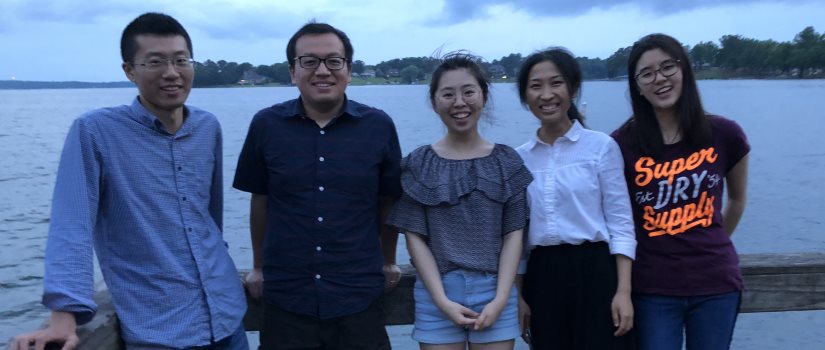Februrary 18, 2019 | Erin Bluvas, bluvase@sc.edu
Two visiting Chinese students, Yuqing Wang and Ke Ju, have made the most of an academic exchange program between UofSC and Nanjing Medical University. These students not only completed research projects during their four months at Carolina, they also published papers on their findings in peer-reviewed journals. Their accomplishments exemplify the intended purpose of the exchange program, which was established in 2016.
“This program was designed to increase collaborations in research and education between faculty and students,” says health promotion, education, and behavior professor and SmartState Endowed Chair of the Center for Healthcare Quality Xiaoming Li, who helped develop and administer the program. “One component of the program was the research internship for Nanjing Medical University students who came to USC for a semester-long research training under the joint mentorship of both USC and NMU faculty.”
“Nanjing Medical University is one of our most valued partners,” adds Allen Miller, vice provost and director of Global Carolina, the program that develops initiatives, such as this one, with other institutions around the world. “These students’ amazing success reflects the positive benefits we see every day from increased international collaboration.”
Since the program began, the number of Nanjing Medical University students participating in the program has grown from six students in 2016 to 17 in 2019. Wang and Ju spent the spring semester of 2017 studying at the Arnold School and conducting research in the environmental health sciences department’s Reproductive Toxicology Laboratory.
The lab is directed by assistant professor Shuo Xiao, whose research focuses on women’s reproductive health and toxicology, but with a twist. He studies how environmental toxins and pharmaceutical compounds impact women’s reproductive health and fertility. The methods Xiao uses include in vivo animal models, 3D in vitro tissue culture models, and human epidemiological studies.
Under Xiao’s guidance, Wang and Ju conducted surveys assessing attitudes and knowledge related to female oncofertility—a term coined by Teresa Woodruff to describe the combined fields of oncology and reproductive medicine to explore and expand fertility options for cancer survivors. Though Wang and Ju worked collaboratively on each project and the resulting papers, they each had the opportunity to serve as lead author for the papers on their respective studies.
“The experience of conducting this research benefits me a lot in my current postgraduate study because I have learned how to write a scientific paper, explore an unknown field, and overcome research obstacles with courage and patience,” says Ju, who completed her undergraduate program in 2018 and now is a graduate student in the master of public health program at The Chinese University of Hongkong. “It is also a precious experience of cooperating with these hard-working and inspiring researchers.”
Wang led the survey assessing the female oncofertility attitudes and knowledge among reproductive health professionals in Shanghai, which was published in Future Oncology. Ju collected data on reproductive health professionals’ attitudes and knowledge related to female fertility preservation in Fujian, China (published in the Journal of Adolescent and Young Adult Oncology).
“USC benefits from this program by having excellent students who can help us on scientific projects as well as opening potential collaboration opportunities for principal investigators between USC and NMU,” says Xiao. “For the students, as most of them will go to graduate school, they can systemically learn how to begin and complete a scientific project, write and publish manuscripts, and attend and present at regional and national conferences.”
Both students recommend the exchange program to others. In fact, two of this spring semester cohort’s students were referred to the program by Wang.
“Teachers at USC were so nice and they always make me feel like home, and thanks to Drs. Li and Xiao’s arrangement, we were able to attend many lectures and learned a lot,” Wang says. “My classmates were so nice; they helped me adjusted to the life abroad and we became friends.”
Related:
Works done by researchers from the University of South Carolina and Nanjing Medical University
